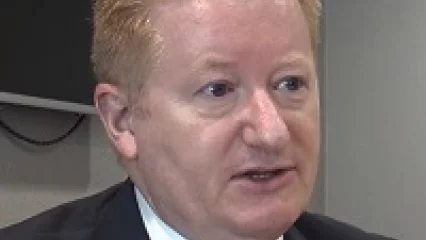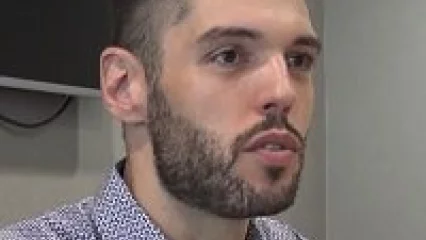[0:31] Q: What makes your program different and unique?
[0:39] A: The EMBA program at IESE Business School has been around since 2001. The special thing about our program is that we offer the entire journey on our own campuses. It’s not a partnership between different schools. We control the whole learning process from A to Z and we try to create what we call “global natives” – people who are able to be efficient when working in very multicultural and global settings. One of our hallmarks is our humanistic approach. We really try to develop and train managers to help them to have a real impact not only on their organization, but also on society if possible.
[1:40] Q: How does an applicant know that your EMBA program is suitable for them?
[1:47] A: The work starts on your own before you even contact schools. You need to think very carefully about why you want to do this, your goals and objectives, and be very clear about that. Once you start talking to different schools you will find out which programs are most likely to help you reach those goals and motivations.
Check out: MBA Admission at Loughborough University
[2:10] Q: Is there a part of the application package that you pay particular attention to?
[2:15] A: We are looking at one particular aspect of the application. We try to get a global view of the candidate. To us, it’s important that at least three main criteria are fulfilled. First of all, the candidate should be able to add to the learning experience of others. It is crucial for the case method that participants contribute towards the learning of others.
When it comes to the basic criteria, we ask for at least 10 years of work experience, 3-4 years of leadership experience, international exposure, and, of course, fluent English.
The second part, which is equally important, is what your goals and objectives are for considering this study. How will we be able to help you bridge the gap between where you are and where you want to be?
The third criterion is the reality – will you have the time and commitment to be able to do a good job? Will you be able to manage financially? So these are the three elements that we look for in the application.
[3:25] Q: How important is the application essay compared to test scores? What do you pay most attention to in an application essay?
[3:35] A: Our program caters to candidates who are typically between 35 and 45 years old with at least 10 years of work experience. Therefore, test scores are just additional information. We really try to make a global evaluation of the candidates. We look at their trajectory, what they have achieved, what they can offer the program. What we look for in the essay is a confirmation of all these things. We ask about your responsibilities, your motivations, your goals and objectives, examples of leadership experience. It’s really about getting a global and holistic view of the applicant.
[4:32] Q: What are some common mistakes that EMBA candidates can easily avoid during their application?
[4:41] A: It is my impression that sometimes they think that this is an exam or a test. They think there are certain things that we want to hear or that they need to present themselves in a certain manner. I always remind people that it’s much better to just be yourself and to be authentic. At the end of the day, we have your best interest in mind. We would recommend that you join the program only if we think that this is really right for you. It’s not in your interest to pretend to be someone you’re not. Just be yourself!
[5:26] Q: What tests do you require for admission?
[5:30] A: We generally require the GMAT. It can be waived if we consider that your experience and professional and academic background prove that you have the qualities needed for the program. The case method required very fluid interaction, so we also require a high level of English. If you have not worked or studied in an English-speaking environment, we would also ask you for a TOEFL or IELTS test.
Check out: How to Prepare for an MBA Admission Interview
[6:04] Q: What is the financial support you offer to applicants and what is the most important part of the application package for securing a scholarship?
[6:14] A: Applicants who have been admitted to the program can be eligible for a loan from some local Spanish banks with which we cooperate. They can finance up to 80% of the tuition fees.
We also have a scholarship program and we have some scholarships that are specifically targeted to women because we encourage the participation of women. In our last program, we had 40% female participants. You can apply for these scholarships once you have gained admission, so first you need to have been offered a place in the program. Then, we ask for a separate application with some motivational essays and some information about you.
However, these are not scholarships awarded according to financial need. They are merit-based which means we look both at the original application package and the scholarship application. The objective is to make sure that the best applicants for the class are encouraged to join the program which will in turn benefit the entire class.
[7:40] Q: How much in advance should applicants start preparing?
[7:51] A: It depends on the circumstances. I have had applicants who have joined the program after initiating the preparation process 3-4 weeks in advance and others who start years in advance. It’s important that you start thinking about what you want to do in advance and that you adjust your cognitive processes accordingly. And, of course, you also need to prepare your surroundings – your professional surroundings, to make sure you have the time to dedicate to your studies, as well as your personal or family situation. Depending on the circumstances, some people start one year in advance and others – 7-8 months in advance.
[8:53] Q: How important are recommendation letters?
[8:56] A: These are very important because they allow us to get some external confirmation of our impressions and establish whether they are correct. They also prove that the information you have provided is correct regarding your professional background. We really prize your recommendation from your direct supervisor because that gives us the confidence that you are supported in your decision to start the program. It also adds the most recent evaluation of your professional experience.
[9:38] Q: What do you look for in a CV/resume and how is it different from a job application?
[9:46] A: When it is a job application, you are trying to explain why you are the right person for that specific job. So you need to structure your CV in such a way that you bring across those strong points that are important for that particular position. What I look for in a CV for an application to a program such as ours is a clear idea of what you have been doing throughout your professional life. I look at location, job responsibilities, whether you led teams and how many, whom you report to and your geographical scope. We help people and coach them in terms of indicating to them how to structure their CV to make sure their profile comes across in the best way.
[10:53] Q: Is there anything else that you would like to add?
[10:56] A: We realize that the learning process is better for everyone when experienced people of diverse backgrounds join the program. Equally important is that your work in the program enables you to apply your learning directly in a work context. In turn, that also helps you give better input, feedback, and contributions to the class. Having had significant work experience and responsibilities is something we are looking for.
In addition, we feel it is beneficial for participants to be working full-time while doing the program because it helps you learn how to delegate more and how to be more efficient in terms of delegating tasks. You are tested more and leave your comfort zone when your study and work situation is challenging. I am saying this because some people think that it may be a good time to take a sabbatical or to work part-time while doing the program. Of course, for some people that may be the only way to do it. But it is actually more beneficial for you and your learning if you can combine the two.


